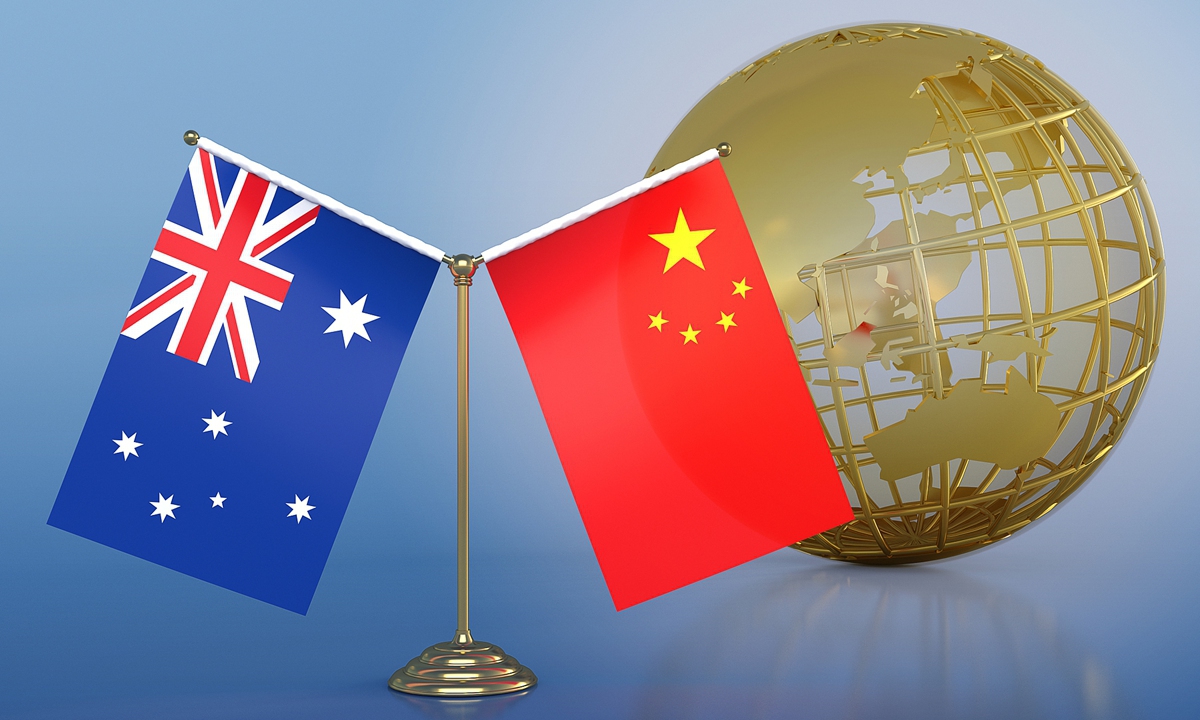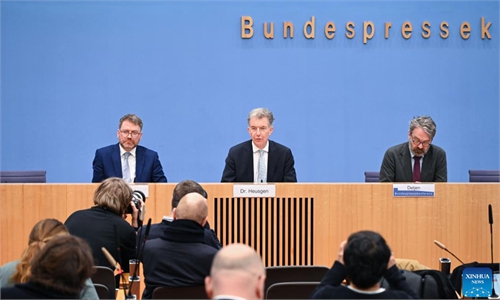IN-DEPTH / DIPLOMATIC CHANNEL
Australia tying itself closely to unstable and declining US is foolish: Australian author

China Australia Photo: CFP
Editor's Note:
Recently, Australian historian author John John Queripel wrote an article titled "China: learning from Canute," published on Pearls and Irritations, which gained widespread attention as the article provides a keen analysis of Western smears against China as well as Australia's relations with China and US influence therein. Global Times reporter Xie Wenting (GT) conducted an exclusive interview with John Queripel to further explore his opinions on China's development and US influence on Australia's foreign policy, among other topics.
GT: What do you believe is the future of China-Australia relations and the influence of the US in the region?
Queripel: The demise of the previous Sinophobic government under Scott Morrison and its replacement by one led by Anthony Albanese has seen a slight upturn in relations. The hostile rhetoric has been somewhat laid aside, and trade has returned to normalcy. Yet, Australia is increasingly becoming an integral part of US war planning. Those of us working for a sensible relationship between our countries are still faced with a largely hostile political climate, a media, including public broadcasters, who are vehemently anti-China, along with a security and military establishment premised on opposing China.
As for the US influence in the region, it will inevitably diminish. Nations of the region will no longer perceive it as a stabilizing influence. ASEAN represents a significant success story, founded on trade, and is committed to ensuring the region remains stable, avoiding disruption by military adventurism. Furthermore, in the US, there are strong isolationist currents. The US is likely to be squeezed out of the region anyway. Three of the world's four largest economies will soon be Asian; China, India, and Indonesia. The US will be seen as an interloper.
GT: You once said that Australia has lost its sovereignty to the US. How do you assess the influence of the "follow the US' policy" that Australia has chosen with regard to China-Australia relations? How does it harm bilateral relations and cooperation as well as Australia's own interests?
Queripel: Regarding China as an aggressive military threat to Australia is totally unrealistic. Propaganda has it that China covets Australian resources and could invade to take them. This is the madness we get in the Australian media, from some irresponsible politicians and even some of the security services.
There is nothing in China's long history, extending back almost 5,000 years, which would provide any evidence for them being an aggressive threat. China has never invaded anywhere not contiguous with its own territory. That is a peculiarly Western thing, as history shows.
Quite clearly the US has determined it can constrain China. It has set up a series of military bases in an arc around China, from South Korea, Japan, and the Philippines, to Australia. It aggressively sails its warships right up to the Chinese shores.
Australia is a part of this. Northern Australia has become heavily militarized with the presence of US forces and weaponry under the Force Posture Agreement. The aforementioned submarines are also designed to be part of US blockading of the South China Sea, something they ingeniously accuse the Chinese of doing. Why China, the world's greatest trading nation, would want to blockade trade to its own shores, no one has been able to say.
GT: Could you elaborate on the impact of China's rise on Australia and its relationship with the US?
Queripel: Australia is caught as a small player between its traditional security alliance with the US and its increasing economic dependence on China. Over 30 percent of Australia's exports go to China. Until 2017 these roles were rather complementary. At that point however, the US determined that China was not going to play its game, become like it, and seeing that, suddenly decided China would be turned from being a partner in the world economy, to being an enemy. Australia, almost as though under orders, quickly followed suit.
Australia has become increasingly pulled into being a sub-imperial power to the US. The result has been the Quad and AUKUS, even a toying with NATO. Of course all these are aggressively aimed at China. Australia is committed to spending $240 billion on a nuclear submarine program directly aimed at China. Not much of it makes logical sense. Hysterical propaganda, run even by previously reputable media, has China attacking Australia tomorrow, yet Australia has submarines on order that will take another 20 years to complete. Australia is tying itself ever more closely to an unstable and declining power. This is foolish, and against Australia's own interest.
GT: From your point of view, why do certain Western media outlets and some politicians like to hype up the claim that China's run is nearing the end? How do you assess the resilience of the Chinese economy?
Queripel: They hype it as they perceive China as a threat to them. That is the only way they can see it. For them it is a winner takes all model. A win-win model, as China is setting in place through the Belt and Road Initiative (BRI), BRICS and the Shanghai Cooperation Organization (SCO), is inconceivable to their eyes. The Western economic model has been, and still is, based around sucking up profits from around the world, and impoverishing nations by taking those profits and materials back to the colonial powers - the metropoles. China itself knows that well from "the century of humiliation."
Of course that is all now changing through the networks China has been at the core of. BRICS is now larger than the G7, and the gap is widening. BRI now encompasses 150 nations. The order from which the West so profited for 300 years is rapidly changing. It is not only China, but also India and Asia as a whole. To many in the West, this is threatening. It is perceived as an attack on what has seemed to be a natural order of Western domination.
I am convinced of the resilience of the Chinese economy. The government has diversified the economy, turning it from being primarily an export economy, often of cheap consumer goods, to being a circular economy increasingly based not only on exports but also internal consumption. That obviously will largely insulate it from the actions of outsiders seeking to frustrate its growth. Infrastructure is core to growth and China has developed that at a pace which leaves others in its dust. Furthermore, the organizations of which I have just spoken will ensure its resilience. China is the world's greatest trading nation. That is the reason for Western military aggression against China. Trade abhors war and loves peace. Yet, many in the West make out that it is China which is the aggressive threat. From what I just said concerning trade, that is profoundly illogical.
GT: You recently wrote the article "China: learning from Canute," in which you gave strong evidence to refute that China's collapse is imminent. What inspired you to write this article? What feedback have you received in Australia after publishing the article?
Queripel: Western media is constantly saying that the "China bubble" is about to burst and the Chinese economy is about to fall. What's strange though is, that bubble, rather than bursting, keeps getting larger. Of course as the Chinese economy has grown the stratospheric growth rates from the past of 11 and 12 percent per annum are no longer possible as the economy is growing from a higher level. Still the 5.2 percent of the past year means that the Chinese economy will double in just 14 years. In comparison that of the US is growing at 1.6 percent. Over the same time it will grow 25 percent. The math makes what is happening to our world obvious.
Since the opening up under Chinese leader Deng Xiaoping, the Chinese economy has grown some 40-fold. This is phenomenal! When I was young (I am 69), China was almost synonymous with "poverty." Now on the best measure Purchasing Parity Power (PPP) it is the largest economy in the world! It soon also will be in terms of nominal GDP, with 800 million lifted out of poverty. It is unbelievable. That's over 30 times the population of my country, Australia. I was recently in China and would look at people my age and wonder whether they had registered some kind of "economic shock" at the enormous change. It must be almost impossible for their grandchildren to understand the magnitude of the change.
GT: China has developed friendly relations and cooperation with many countries in the South Pacific region, including possible security cooperation. However, this cooperation has drawn criticism and has even been hindered by Australia and the US. What's your take on it?
Queripel: The connections which the Solomon Islands, in particular, developed with China almost caused an apoplectic fit in Australia. Much of it was paternalistic, alleging that the "naïve" Solomon Islanders were being manipulated by China. That type of attitude is precisely the problem that Australia has had with the Pacific. Not only Australia, but the US also. The Pacific nations have simply been regarded as "belonging to us." That has changed. Chinese interest in the Solomon Islands, Vanuatu, Kiribati, and Papua New Guinea, among others, has suddenly spurred a renewal of interest from both Australia and the US, who had previously left the region as a backwater for years.
I could add that Australia dragging its feet on climate change didn't help. The current leader of the opposition, Peter Dutton even made fun of Pacific Islanders being concerned about the inundation of their homes by rising ocean waters.
GT: How do you respond to critics who argue that China's rise poses significant challenges and risks to regional and global stability and security?
Queripel: I have consistently argued that China represents no threat. There are several reasons. Let's commence with history. As I have said, Chinese history shows no interest in aggressive overseas ventures. Philosophically at the core of Chinese thought is the concern for Tianxia (stability under heaven). Over the last 200 years, China has had enough instability through conquest and internal upheaval. They are unlikely to initiate such. Trade is at the heart of China's economic revival. China will not put that at risk through military adventurism. Finally, China is not a military state.
It is not China which represents a threat, but rather the US, so committed to war as a means of dealing with conflict. In that path it has been stunningly unsuccessful in the last 50 years. China is showing a different way to trade. It is building cooperative networks and supporting multilateral initiatives. Rather than a threat, China represents a new and better way of doing things.


